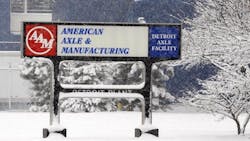American Axle Misses on Metaldyne Acquistion
What not to do in M&A:
Expand in a market that many think has peaked. Pay a huge premium to expand in said industry Roughly double your debt load to fund that expensive price tag.
Or, you could be like American Axle & Manufacturing Holdings Inc. and do all three of those things. On Thursday, the maker of axles and crankshafts for pickup trucks announced it was going to acquire car-parts supplier Metaldyne Performance Group Inc. for $3.3 billion, including the assumption of $1.7 billion in net debt.
If you do the math on that, Metaldyne's debt is worth more than the company's equity--even with a more than 50% premium tacked onto the stock's unaffected price.
On that premium: The average paid in recent major auto-parts deals is about 30%, according to data compiled by Bloomberg. Considering that the best days for growth in the auto market appear to be behind us, it's unclear why anyone would pay more than what's typical.
Just Wednesday, final data showed U.S. automakers had significantly increased discounts only to draw weaker October sales than last year. Sales are still at a healthy level--but the best-case scenario is that they stay flat.
American Axle is offering Metaldyne shareholders $13.50 per share in cash and 0.5 in stock. The value of the stock portion has shrunk because--unsurprisingly--shareholders of the acquirer weren't overly thrilled with this deal. But based on Wednesday's close, the proscribed offer price amounted to a little under $22--a level that Metaldyne shareholders hadn’t seen in about a year and a much higher price than analysts had expected the company to reach on its own. That's great news for Metaldyne holders; less great for American Axle investors.
The benefit of the Metaldyne takeover is that it will reduce American Axle's reliance on General Motors Co., which accounts for about two-thirds of its revenue. American Axle was formerly a part of GM before an investment group acquired it and took it public in 1999. The automaker later agreed to make payments that helped American Axle avoid bankruptcy during the financial crisis.
Diversity is a good thing, but it's worth noting that Metaldyne's biggest customer in 2015 was Ford Motor Co.--which reported October U.S. sales on Wednesday that fell more than analysts had expected and has said profit will decline this year and next as it increases spending on autonomous and electric cars.
There are cost savings to be had from this combination--as much as $120 million by 2018--and American Axle expects the deal to be accretive to cash flow and earnings per share in the first full year. But the company is undoubtedly putting itself in a more precarious financial position in its quest for those benefits.
The Metaldyne takeover will increase American Axle's net debt to about 3.5 times the company's adjusted Ebitda. As Bloomberg Intelligence analyst Joel Levington points out, that's roughly in line with the company's burden back in 2013 before a multiyear effort to get its balance sheet in better shape. It's all the more painful for bondholders because things were going so well. American Axle said it had reduced its leverage ratio to 1.6 as of the end of the third quarter. Fitch saw enough improvement to upgrade the company's credit rating in October.
Well, it was fun while it lasted. Here's what bonds affiliated with American Axle did on Thursday:
Metaldyne's controlling shareholder American Securities LLC has already agreed to vote its 76% stake in favor of the deal, but American Axle shareholders should have a say in whether it gets done. If they're looking for help putting their disappointment into words, might I point out this quote from American Axle CEO David Dauch back in 2012:
“We worked too hard to establish this company to restructure it in 2008-2009. We don’t want to do anything that’s going to put the core business at risk. We’re open to strategic opportunities, but we have to keep it in balance.”
That about sums it up.
-By Brooke Sutherland
This column does not necessarily reflect the opinion of Bloomberg LP and its owners.
